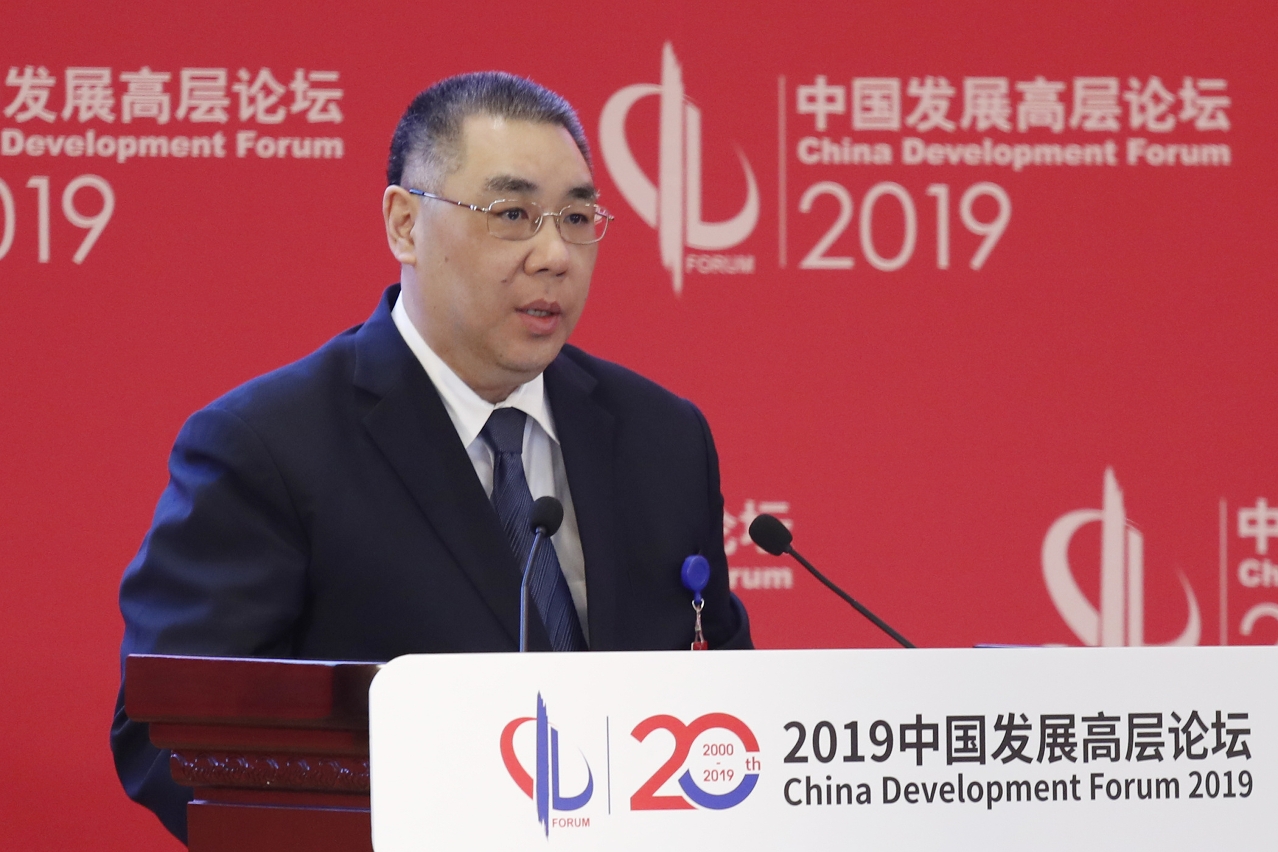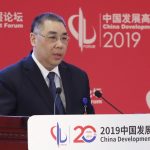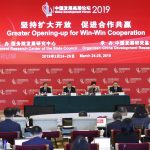 The Chief Executive, Mr Chui Sai On, speaks at the“Guangdong-Hong Kong-Macao Greater Bay Area in the Global Economy” session.
The Chief Executive, Mr Chui Sai On, speaks at the“Guangdong-Hong Kong-Macao Greater Bay Area in the Global Economy” session.
The development of the Guangdong-Hong Kong-Macao Greater Bay Area (Greater Bay Area) is a proposition for the modern era, and society must accurately understand how it should be interpreted, said the Chief Executive, Mr Chui Sai On.
The plan needed to be seen in the context of the material significance of the nation’s new round of reform and opening-up, he added. There also had to be organic integration and effective implementation in society of the important instructions of President Xi Jinping regarding the “Four Aspirations” for Macao, while also a demonstration of modern, innovative ideas in thinking, positioning and planning, further stated Mr Chui.
The Chief Executive attended the China Development Forum 2019 in Beijing on Monday (25 March), and delivered during a session there a speech titled “The Guangdong-Hong Kong-Macao Greater Bay Area in the Global Economy”.
He said that society must, respectively: identify and make use of the advantages of the principle of “One country, two systems”; persist in upholding national interests and the need to focus on a big-picture view of events; and jointly explore opportunities and ways of achieving closely cooperation between sister cities of the Greater Bay Area.
The forum session was titled “The Guangdong-Hong Kong-Macao Greater Bay Area in the Global Economy”. It was hosted by the Deputy Director of the Development Research Centre of the State Council, Mr Wang Anshun. Speakers included the Governor of Guangdong Province, Mr Ma Xingrui; and the Chief Executive of the Hong Kong SAR, Ms Carrie Lam Yuet-ngor; as well as the Chief Executive of the Macao SAR, Mr Chui Sai On. The speakers also responded to questions from the audience. The Director of the Development Research Centre of the State Council, Mr Li Wei, was among the guest attendees.
Mr Chui said that the Greater Bay Area had taken on the role of changing the approach to economic growth, with the aim of creating a coastal zone that was the best and most innovative place in the world; and thereby creating unprecedented development opportunities for Macao. The Macao SAR Government would fully support the country's overall planning of national development, and enhance liaison and communication with all parties, in order to deepen cooperation in that regard.
Mr Chui outlined his five points on such matters, as follows:
First, the “Outline Development Plan for the Guangdong-Hong Kong-Macao Greater Bay Area” (also known as the “Outline Development Plan”) was –besides serving as proof of the success of the country’s reform and opening-up during the past 40 years – also a plan to realise national development in the new era, and a blueprint for a new round of reform and opening-up of the country. The Outline Development Plan would facilitate quality development and foster China's national rejuvenation.
The Greater Bay Area was perfectly positioned and had significant advantages: economic strength; resources for innovation; a pioneering role in setting of international standards; and a well-established foundation for cooperation. It enjoyed a vital strategic position in overall national development, acting as a reference point in terms of leadership for other regions, he added.
Second, said Mr Chui, the Outline Development Plan was recognition of the contributions of Hong Kong and Macao in the process of national reform and opening-up, and of the advantages accruing to the two Special Administrative Regions under the principle of “One country, two systems”.
Mr Chui said he believed that development of the Greater Bay Area should focus on: deepening and upgrading Guangdong-Hong Kong-Macao cooperation; promoting implementation of the “One country, two systems” principle; ensuring Macao’s long-term prosperity and stability; and further making use of the respective functions of Guangdong, Hong Kong and Macao in the national reform process. To participate in the development of the Greater Bay Area, society should consider and understand the most significant advantages of the “One country, two systems” principle, he added.
Third, said the Chief Executive, the development of the Greater Bay Area enabled Macao to participate in national strategic development, integrate into overall national development, and realise its positioning as set at a national level, thus allowing Macao to achieve adequate economic diversification and providing it with historic opportunities to maintain long-term prosperity and stability.
Mr Chui said that, based on Macao’s positioning as “One Centre, One Platform”, the Outline Development Plan also endowed Macao with a new mission: to establish a multicultural exchange and cooperation base with an emphasis on Chinese culture. As one of the four core cities of the Greater Bay Area, Macao should make use of several functions: as an engine for development; and as an anchor point for construction of the Guangzhou-Shenzhen-Hong Kong-Macao Technology Innovation Corridor. Macao should seize these opportunities, and proactively strive to participate in the development of the Greater Bay Area.
Fourth, the Greater Bay Area would raise brand-new development opportunities for Guangdong, Hong Kong and Macao, but would also require those three places to deepen their cooperation. As opportunities and challenges coexisted, society should strengthen the unification principle in order to seize the opportunities of the Greater Bay Area and overcome the challenges.
Mr Chui said society should persist with viewing matters in the context of “One country”, and achieve the necessary balance regarding the differences in the “Two systems” and in relation to “Three jurisdictions with three taxation systems”. Promoting construction of the Greater Bay Area meant turning challenges into opportunities, and focusing on resolving the differences in economic, legal and administrative systems. Macao attached importance to regulatory connections and system innovations, and would work together with other sister cities of the Greater Bay Area to explore and pioneer innovative cooperation and thereby achieve desirable breakthroughs.
Fifth, said Mr Chui, development of the Greater Bay Area was a proposition for the modern era. He stressed that it should be integrated with the implementation of the important instructions of President Xi Jingping on the “Four Aspirations” for Macao, to establish a united market through cooperation and fulfil the duty of economic integration and innovation in the new round of China’s reform and opening-up.
In conclusion, Mr Chui said the Macao SAR would continuously, comprehensively and intensively study the important instructions of President Xi Jingping regarding the development of the Greater Bay Area, fully implement the Outline Development Plan, and align with the strategic intentions of the Greater Bay Area. This was in order to: make use of Macao’s advantages; serve the country’s needs; enhance the supporting and leadership functions of the Greater Bay Area in national economic development; promote the formation of a new environment for reform and opening-up of the country; facilitate implementation of “One country, two systems”; and contribute to realisation of the Chinese Dream of national rejuvenation.
Attendees at the session titled “The Guangdong-Hong Kong-Macao Greater Bay Area in the Global Economy” included the Chief-of-Office of the Chief Executive's Office, Ms O Lam; the Director of the Policy Research and Regional Development Bureau, Mr Mi Jian; the Director of the Government Information Bureau, Mr Chan Chi Ping; the Director of the Protocol, Public Relations and External Affairs Office, Ms Lei Ut Mui; and the Director of the Office of the Macao SAR in Beijing, Ms Leong Kit Chi.



